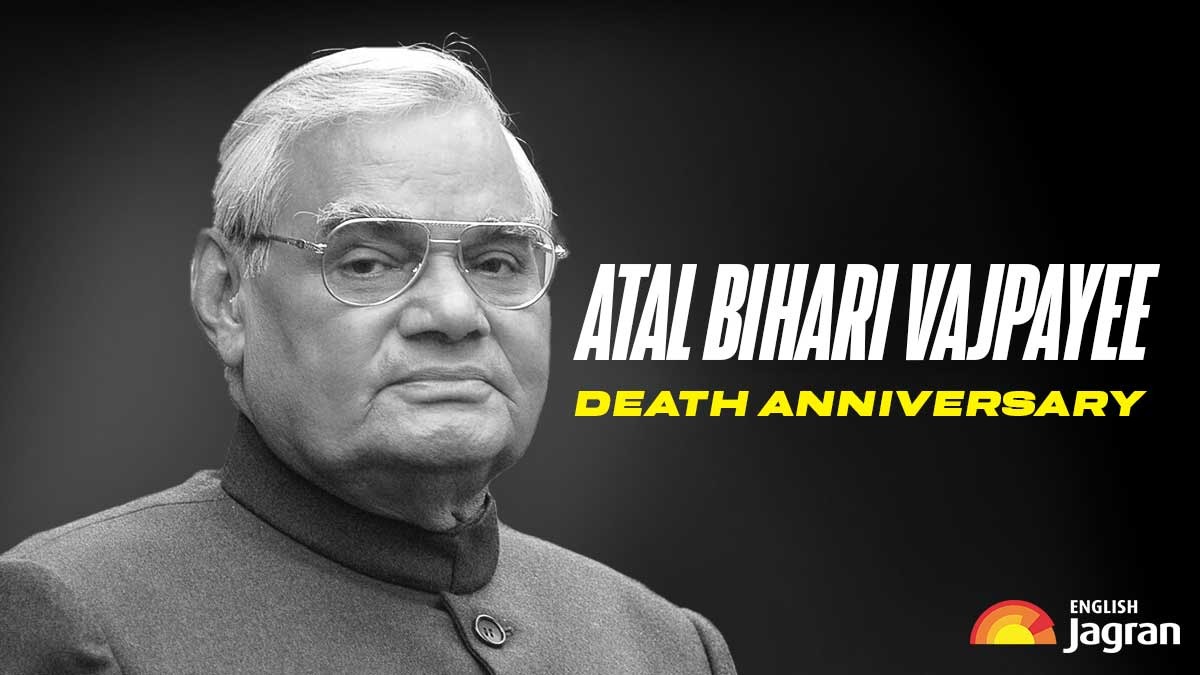


Leaders of India, including President Droupadi Murmu, Vice President Jagdeep Dhankhar, Prime Minister Narendra Modi, and Lok Sabha Speaker Om Birla, paid tribute to former Prime Minister Atal Bihari Vajpayee on his sixth death anniversary. Vajpayee, who passed away in 2018, was a renowned leader and a towering figure in Indian politics, who made history as the first non-Congress Prime Minister to complete a full term in office. His contributions and vision continue to be remembered and honored by the nation.
Remembering Atal Bihari Vajpayee: A Legacy of Leadership and Vision
Background
Atal Bihari Vajpayee, one of India's most revered leaders, passed away on August 16, 2018, leaving an unfillable void in Indian politics. A renowned statesman, orator, and visionary, Vajpayee played a pivotal role in shaping modern India.
Born on December 25, 1924, in Gwalior, Vajpayee joined the Rashtriya Swayamsevak Sangh (RSS) at an early age and became actively involved in the Indian independence movement. He entered electoral politics in 1957 and served as the Member of Parliament (MP) for Balrampur in Uttar Pradesh for a record 10 terms.
Vajpayee's political career culminated in his three terms as India's Prime Minister. His first tenure lasted from May 1996 to June 1996, followed by a 13-day stint as Prime Minister in 1999. His final and longest-serving term began in October 1999 and ended in May 2004.
Legacy and Contributions
Vajpayee's leadership was characterized by bold initiatives and a commitment to economic development while upholding India's core values. Some of his most notable achievements include:
Tributes and Remembrance
On the sixth anniversary of Vajpayee's death, Indian leaders paid heartfelt tributes to his legacy. President Droupadi Murmu, Vice President Jagdeep Dhankhar, Prime Minister Narendra Modi, and several other dignitaries visited the Vajpayee Memorial at Rashtriya Smriti Sthal in New Delhi to pay homage.
"Atalji remains an inspiration to us all. His vision and leadership will continue to guide us in the years to come," said Prime Minister Modi in a tweet.
FAQs
What was Atal Bihari Vajpayee's political ideology? Vajpayee was a lifelong member of the Bharatiya Janata Party (BJP) and subscribed to the party's ideology of integral humanism ("Ekatma Manavvad"), which emphasizes the unity of all living beings and the importance of social harmony.
What are some of Vajpayee's most famous speeches? Vajpayee was known for his eloquent and powerful speeches, including his "Tryst with Destiny" speech at the United Nations General Assembly in 2003 and his "Lotus Bloom" speech during the BJP's victory rally in 1984.
What was Vajpayee's role in the formation of the NDA government in 1998? Vajpayee was instrumental in forming the National Democratic Alliance (NDA), a coalition of center-right parties, which enabled him to become Prime Minister after the 1998 general elections.
What is the significance of the Pokhran-II nuclear tests? The Pokhran-II nuclear tests established India as a nuclear power and were a significant milestone in the country's defense history. They also led to international pressure and sanctions against India.
How is Vajpayee's legacy preserved? Several institutions, such as the Atal Bihari Vajpayee Institute of Good Governance and Policy Analysis, the Atal Bihari Vajpayee Educational Institute, and the Atal Bihari Vajpayee Centre for Policy Research, work to promote and disseminate his ideas and contributions.

The Supreme Court has directed the formation of a Special Investigation Team (SIT) to conduct a fact-finding inquiry against Vantara, an animal rescue and rehabilitation center in Gujarat, following allegations of non-compliance with laws and acquisition of animals. The SIT, headed by former apex court judge J Chelameswar, will also look into reports of irregularities and complaints from NGOs and wildlife organizations. Vantara has assured full cooperation to the probe and reaffirmed their commitment to animal welfare.

The ongoing family feud within the Rashtriya Janata Dal (RJD) continues to escalate as three more daughters of party patriarch Lalu Prasad Yadav have left the family residence in Bihar's capital Patna. This comes just a day after another daughter, Rohini Acharya, publicly denounced the family and quit politics following the party's poor performance in the recent elections. Amidst allegations of insults and mistreatment, the saga continues to unfold within the Yadav family.

In a special lecture series in Bengaluru, RSS chief Mohan Bhagwat emphasized on the Hindu identity as a responsible and proud son of Bharat Mata. He urged the Hindu society to come together and share the message of 'Vasudhaiva Kutumbakam' with the rest of the world. Bhagwat also recalled the RSS founder and its journey of facing opposition and growth through dedication and sacrifice of its volunteers.

As the West Bengal Assembly elections near, the political battle between Bharatiya Janata Party (BJP) and Trinamool Congress (TMC) has intensified on social media. Following the BJP's victory in Bihar, the party declared its hopes to defeat TMC in Bengal on a popular platform, while TMC leader Kunal Ghosh responded with a proverb highlighting the BJP's potential failure in Bengal. Despite BJP's confidence, TMC remains unfazed and asserts their strong hold in the state.

Congress leader and Leader of Opposition in Lok Sabha, Rahul Gandhi, was criticized by BJP's Shehzad Poonawalla for going on a jungle safari in Madhya Pradesh's Satpura Tiger Reserve instead of focusing on the ongoing Bihar elections. Gandhi had earlier claimed that "vote theft" had taken place in several states, including Madhya Pradesh. BJP's Poonawalla mocked Gandhi's "priorities" and referred to him as the "Leader of Paryatan and partying."

The sudden blast in Delhi that left several people dead has shocked everyone, including Bollywood stars Raveena Tandon, Thalapathy Vijay, Vineet Kumar Singh, and Riddhima Kapoor Sahni. While police are investigating all possible angles, including a terrorist conspiracy, Raveena's comments on social media suggest a link to terrorist activity. The celebrities also expressed their condolences to the victims and their families.

In a historic move, the Madhya Pradesh government has announced that it will be releasing 32 prisoners, including nine from tribal communities, on November 15 to mark Janjatiya Gaurav Diwas or Tribal Pride Day. This decision, initiated by Governor Mangubhai C Patel, aims to recognize and celebrate the contributions of tribal communities on the birth anniversary of their icon, Birsa Munda. This is the first time in India that prisoners will be released on grounds of good conduct while serving jail terms. However, it should be noted that the release will not apply to convicts in cases of rape or the Protection of Children from Sexual Offences (POCSO), as well as those convicted in multiple murder cases.

Today marks the birth anniversary of Birsa Munda, a fearless leader and freedom fighter who fought against British colonial oppression and the exploitation of tribal communities. His legacy of social justice and environmental protection continues to inspire movements in India today. As Jharkhand celebrates his birth anniversary, Birsa Munda's life serves as a reminder of the ongoing struggle for justice and sustainability.

Prime Minister Shri Narendra Modi will visit Gujarat on 15th November for various ceremonies and inaugurations. At a programme in Dediapada, he will inaugurate and lay the foundation stone of multiple development projects worth over ₹9,700 crore, with a particular focus on improving infrastructure and empowering tribal communities. These include residential schools, multi-purpose centres, medical institutions, and marketing centres, among others. The projects aim to uplift marginalized communities and promote the preservation of tribal culture and heritage.

As the NDA secures a clear victory in the Bihar elections, social media has been abuzz with questions about the whereabouts of Rahul Gandhi, the leader of the opposition and supposed face of the Congress in the state. With rumours circulating about him being in London or Muscat, there has been no official confirmation from the party or credible media outlets. This has sparked conversations about leadership and commitment within the party.